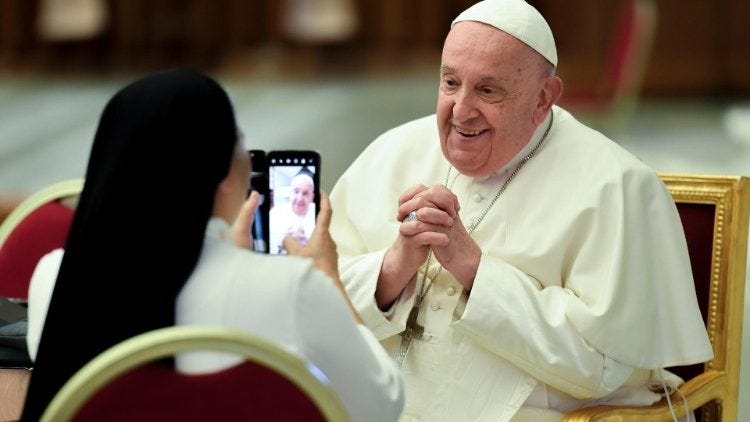Don't let this be Pope Francis's legacy
Talking shops will just ape the Church of England, writes George Pitcher
The almost universal approbation for the life and ministry of Pope Francis, since he died on Easter Monday, makes it practically a sacrilege to sound a note of dissent. But that’s what I intend to do.
It’s not about the man himself, about whom perhaps no ill should be spoken just now. It’s more systemic than that. It’s about his policy of synodality, a word whose Greek root means “journeying together” and requires lots of warm and cosy qualities, such as fraternal collaboration and discernment. And breathlessly described as the most significant development for liberal Catholics since the Second Vatican Council.
As we’ve constantly been told this week, Francis had the common touch, was far more interested in what “ordinary” Catholics thought than cardinals and clergy and wanted to reform his one, universal Church from the ground up rather than top down.
There will be some conservatives and traditionalists who will want to censure him for a legacy that is liberal and woke. In commentary terms, I expect that will start with his funeral this weekend and run through the conclave to select his successor to the Petrine throne.
But it would be churlish to suggest (as some assuredly will) that his mission was cynical and self-centred. His reformist strategies were substantive and founded in generosity of spirit. It’s not that this emperor had no clothes. It’s more that sometimes he wore, as it were, the wrong trousers.
Synodality is a case in point and the danger is that it morphs into synodism. I’m not playing with words here. A synod is essentially a Protestant creation for allowing lay, clerical and episcopal voices to be heard in defining teaching.
Pleasing nobody
It hasn’t had a great record in the Church of England lately. Under the archbishopric of Justin Welby, for instance, we’ve had decisions on same-sex blessings (or weddings) in church that don’t go far enough for progressives and go way too far for traditionalists, thereby pleasing nobody, as well as the utter mess that is ecclesiastical oversight of safeguarding.
This isn’t a model that the Church of Rome should want to adopt. But the runes under Francis weren’t good. Heaven help us, he held a Synod on Synodality, at which the Anglican Church had a diocesan bishop as representative. This had as depressing a ring to it as a committee of committees or a poll of polls – a comprehensive amalgamation of views that becomes meaningless in its scope.
Canvassing grassroots Catholics
This is not to say that Francis shouldn’t have canvassed the desires of what I suppose we must call grassroots Catholics. But it is very much to say, without apology, that the Vatican is not a democracy and that its defining characteristics are authoritarian.
It marks itself out as such. It’s partly but substantially why heretical (to Rome) Protestant European churches and the nascent Anglican schismatic church fought a Reformation against it.
Now we begin to see a Roman Catholic Church embarking on consultative exercises with those who profess its creed and some who do not, without the capacity to act upon them. Papal infallibility is widely misunderstood – it’s an apostolic tradition that the Pope is preserved from error ex cathedra on matters of faith or morals because he succeeds St Peter – but, whatever its finer points, it doesn’t lend itself to government by plebiscite.
Parliament without parliamentary process
The Church of England can show where the latter takes us: Towards a parliament without parliamentary process. General Synod is a talking shop and, unlike the House of Commons, has no elected party of government, just three houses containing wildly differing opinions.
It should be a cause of celebration for Roman Catholics not to be so encumbered. And, for the Church of England, a source of envy. If only its diocesan bishops could be locked in some English equivalent of the Sistine Chapel – the Chapter House of Westminster Abbey perhaps – until white smoke emerged to announce a new Archbishop of Canterbury.
As it is, we have to await the even more opaque machinations of the bureaucratic Crown Nominations Commission, which will take months if not years after a new Pope is enthroned to come up with its favoured name.
Prayer and silence
Much is made of the Synod on Synodality’s investment in prayer and silence in the discernment of divine direction. No one should gainsay that at any level of the Church. It was a stroke of brilliance for Archbishop Rowan Williams at the 2008 Lambeth Conference, riven with dissent over matters of sexuality, to inaugurate Indaba groups, based on African tribal colloquia, prayerfully to address volatile issues.
But such models are inconsistent with the power structures of the Vatican. As the American Catholic academic Peter Beaulieu writes: “Councils and synods are what the Church does, not what the gifted and Eucharistic Church already is—one, holy, catholic and apostolic.”
It would be literally a shame, as well as very sad, if Francis’s legacy became about what the Church simply does, rather than a fresh expression of what it already is.
George Pitcher is a visiting fellow at the LSE and an Anglican priest
*




